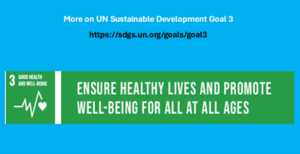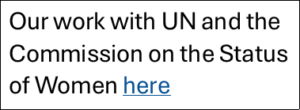Ill-health affects women disproportionately to men
Inadequate health provision detrimentally impacts women, their families, their future health and wellbeing and limits their opportunities in life.
Women spend a greater proportion of their lives in ill health compared with men. They also face greater obstacles to access the care they need.
That’s why Soroptimists work tirelessly to advocate for improvements in health provision for women and why our programme work focuses on providing knowledge and support to women in need.
 The advancement of health is one of our 6 charitable objects and a critical UN Sustainable Development Goal. We know that more work and research is needed on gender-specific issues as well as on the effects of gender-neutral illnesses which adversely affect women because:
The advancement of health is one of our 6 charitable objects and a critical UN Sustainable Development Goal. We know that more work and research is needed on gender-specific issues as well as on the effects of gender-neutral illnesses which adversely affect women because:
- Miscarriage, menopause and maternal mortality remain underfunded and under supported;
- Women have a disproportionate burden of unpaid care responsibilities, which can lead to physical and psychological health problems, as well as meaning they are often lost to the workforce;
- Mental health, particularly conditions such as depression, anxiety, and dissociative disorders associated with sexual abuse, disproportionately affects women;
- Harmful practices like female genital mutilation and child, early and forced marriage threaten physical and mental health;
- Women are under-represented in clinical trials;
- Poor health provision and acts of violence against women and girls reduce their chances of completing education, negatively impacting their future opportunities.
 The right to the highest attainable standard of health is broadly recognised as a fundamental human right. The Beijing Declaration and Platform for Action (BPfA) defines health as “a state of complete physical, mental and social well-being and not merely the absence of disease or infirmity.”[1]
The right to the highest attainable standard of health is broadly recognised as a fundamental human right. The Beijing Declaration and Platform for Action (BPfA) defines health as “a state of complete physical, mental and social well-being and not merely the absence of disease or infirmity.”[1]
In 2025 we reached the 30th anniversary of this landmark document. While advancements have been made, we can say that there are still many areas of women’s health which need to be addressed, most specifically since the Covid pandemic.
A holistic approach that prioritises both physical and mental health, alongside targeted measures to combat violence against all women and girls is required. Safe and accessible health services is key to enabling all women and girls to live with dignity and pursue their ambitions.



